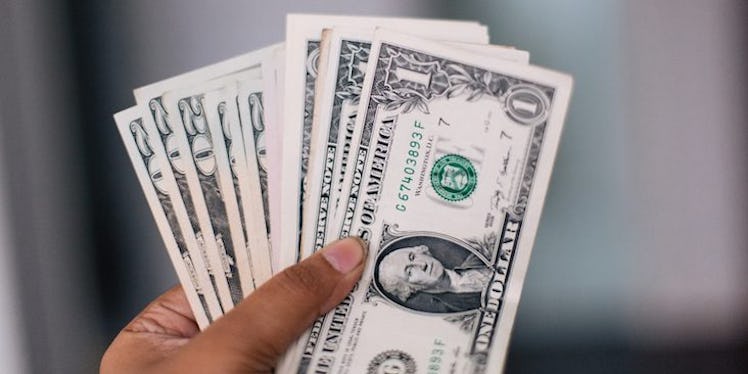
New Study Says Money Can Buy You Happiness, But There's A Bit Of A Catch
According to The Beatles, money can't buy you love. But according to new research, money might just be able to buy you happiness. But wait just a minute before you go to the casino and try to win your way to a happier life. The study, which was published in the Proceedings of the National Academy of Sciences, says money doesn't exactly promise happiness through material purchases.
Rather, if you can buy your way to more free time in your usual schedule, that's when you'll find true happiness.
Let me explain.
You know how you can spend your entire weekend doing laundry, getting groceries, and cleaning your house, just to find, when you're done, you still have to go back to work?
It turns out, if you can outsource some of your tasks and use the extra time to do what you love, life tends to feel a whole lot better.
In the study, a team of international researchers surveyed 6,271 people across the United States, Canada, Denmark, and the Netherlands to test this idea.
Regardless of the level of income, the same link was found between those who “bought more time” and overall life satisfaction.
Participants were asked if they spent money in order to make time for themselves (think getting your lawn mowed or your house professionally cleaned), if they felt satisfied with their lives, and if they felt stressed about having enough time.
The results illustrated that those who spent money on making time for themselves generally felt more satisfied, happy, and less stressed about time.
These findings suggest buying time has similar benefits to generally having more money, lead researcher Ashley Whillans told ScienceAlert.
But the part of the study that surprised even the researchers themselves?
The benefits from buying more time weren't just for rich people who had more disposable income.
The effects of using your money to make more time for yourself showed positive effects on quality of life across the board, regardless of what your paycheck looks like.
The research also included a field study that asked participants to spend $40 one weekend on a time-saving task, and during a separate weekend, to spend $40 on a material object instead. As you may have guessed by now, those who spent the money on the time-saving task felt better than when the money went toward a material purchase.
Interestingly enough, this research also found that many people were hesitant to spend any money at all on time-saving tasks in the first place, even if they had extra income to spare.
Of course, this isn't the first study to support this concept -- previous research supports both the notion that choosing time over more money correlates to an increase in your happiness, and that spending money on experiences rather than material goods leads to a better quality of life.
This sure does make that delivery fee for your groceries seem worth it, huh?